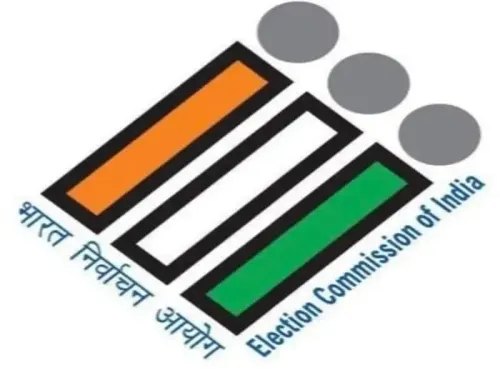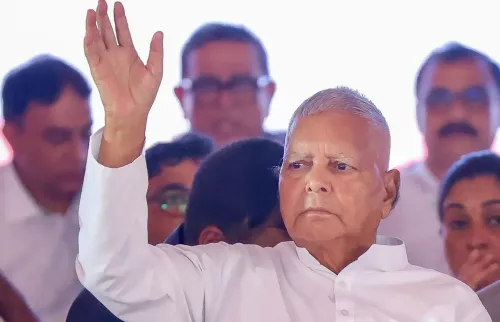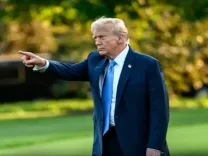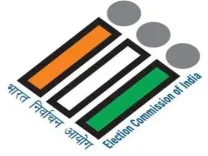Bogus Voters: Mamata Banerjee and ECI's Clash Will Escalate Ahead of 2026 Bengal Assembly Elections
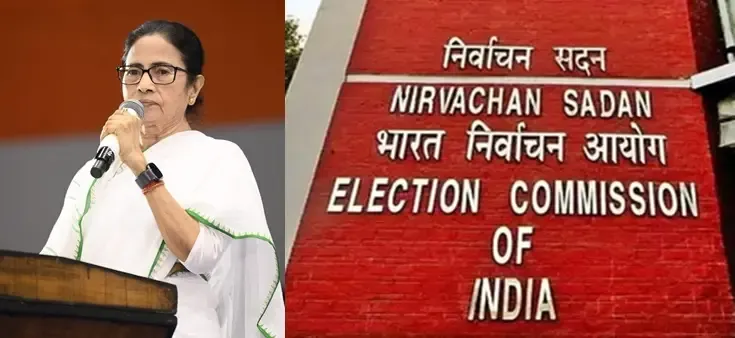
Synopsis
Key Takeaways
- Mamata Banerjee raises concerns about bogus voters in West Bengal.
- The Election Commission of India refutes her claims.
- Political tensions escalate between BJP and TMC.
- Allegations of voter manipulation are rampant ahead of the elections.
- Demographic integrity issues are highlighted by political leaders.
New Delhi, March 2 (NationPress) With the 2026 Assembly elections on the horizon, West Bengal's Chief Minister Mamata Banerjee has raised concerns about the alleged presence of bogus voters in the state's electoral roll. Although the Election Commission of India has dismissed these claims, the debate is far from over.
On Sunday, the ECI responded to CM Banerjee's assertions, stating that duplication in EPIC numbers does not equate to the existence of duplicate or fake voters, while also admitting that some duplicate EPIC numbers may arise due to identical alphanumeric series used by different States/UTs.
The BJP characterized the ECI's statement as a setback for CM Banerjee, who shows no signs of backing down from her confrontational approach towards the electoral body.
Banerjee's claims echo sentiments expressed by other parties in the INDIA bloc, who have faced defeats against the BJP in recent Assembly elections across states like Haryana, Maharashtra, and Delhi.
The timing of Banerjee's allegations—almost a year before the elections and shortly after AAP's defeat—seems aimed at galvanizing party workers for a physical verification of the electoral rolls.
In retaliation, the BJP accused Banerjee of spreading misinformation to prepare for her impending loss in 2026 and to undermine public faith in the electoral process.
BJP's West Bengal co-incharge Amit Malviya alleged that the Trinamool Congress has included the names of illegal Bangladeshi and Rohingya settlers in the voter rolls.
“We urge @ECISVEEP to prioritize cleaning up the voter rolls in West Bengal by removing illegal settlers, whom TMC has used as a vote bank. The ECI must also prevent TMC from removing names of linguistic minorities and Hindu refugees, including the Matua community, who fled religious persecution and settled in Bengal,” Malviya posted on social media.
His remarks align with accusations from Adhir Ranjan Chowdhury, the former West Bengal Congress chief, who claimed TMC has added numerous bogus voters with help from a private agency.
The heated debate over fraudulent voters gained momentum last week when Banerjee claimed that the BJP, aided by two private agencies, was registering voters from states like Haryana, Gujarat, Bihar, Punjab, and Rajasthan as residents of West Bengal.
While addressing party members, the 70-year-old Trinamool leader stated, “They are connecting voters from other states with the EPIC numbers of those in West Bengal. Such manipulations were previously seen in elections in Delhi, Maharashtra, and Haryana, which aided the BJP's victories there.”
“Other parties failed to identify this trick, but we in Bengal have recognized it early, and we will not let this plot succeed here,” asserted the Chief Minister.
Banerjee’s claims about bogus voters parallel remarks from her INDIA bloc colleagues, including AAP National Convenor Arvind Kejriwal, whose party recently lost in Delhi.
Last month, Rahul Gandhi, Leader of the Opposition in the Lok Sabha, accused the ECI of withholding electoral rolls for the upcoming Lok Sabha elections in 2024 and the previous Maharashtra Assembly elections, suggesting that the addition of fraudulent voters was intended to benefit the BJP.
Gandhi raised concerns about alleged discrepancies in the voter list for the 2024 Maharashtra Assembly election won by the BJP-led Mahayuti, claiming that as many as 39 lakh voters were added to the rolls just six months prior to the elections.
On Sunday, Vice President Jagdeep Dhankhar warned about threats to the demographic integrity of Bharat, highlighting sudden changes in demographics in specific areas that can affect electoral outcomes.
Delivering the fourth P. Parameswaran Memorial Lecture on the topic of ‘Democracy, Demography, Development and the Future of Bharat’ in Thiruvananthapuram, the former Governor of West Bengal stated, “There are regions in our country that have emerged in recent years, where the election results are often predetermined by demographic dislocations.”
He emphasized, “Policy measures alone won’t suffice to tackle these formidable challenges. We must recognize these issues as critical to our nationalism and democracy.”
More than 7.5 crore voters in West Bengal are expected to elect 294 new legislators around April-May next year. In the previous 2021 Assembly elections, the TMC secured 215 seats, surpassing the 148-seat mark required for a majority.
Factors like anti-incumbency, allegations of corruption, job scandals, claims of sexual assault on women in Sandeshkhali, and public outrage over a doctor’s rape and murder in a Kolkata government hospital are anticipated to be focal points raised by opposition parties in the 2026 Assembly elections.


